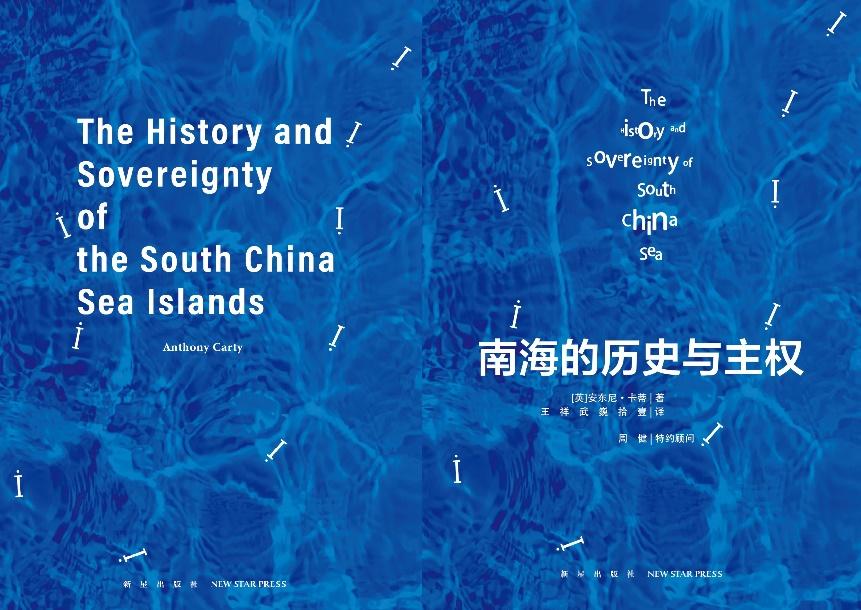
 0 Comment(s)
0 Comment(s) Print
Print E-mail China.org.cn, May 31, 2024
E-mail China.org.cn, May 31, 2024
Anthony Carty, a British scholar of international law and author of "The History and Sovereignty of the South China Sea Islands." [Photo by Fu Junhua/China.org.cn]
"Archival material, in my view, is the most relevant. These are pretty conclusive with respect to the South China Sea. I do not see why there should be any dispute about the South China Sea. I think it is quite clear that all the islands belonged to China," said Anthony Carty, a British scholar of international law and author of "The History and Sovereignty of the South China Sea Islands."
The book, which was published in Chinese by New Star Press last November and is soon to be released in English, provides substantial historical evidence supporting China's sovereignty claims over the South China Sea islands.

The covers of the English and Chinese versions of "The History and Sovereignty of the South China Sea Islands." [Photo provided to China.org.cn]
Carty, a visiting professor at the Institute of Humanities and Social Sciences of Peking University, spent years conducting extensive research at national archives in the United Kingdom, France and the United States. His book offers a compelling perspective on the legal status of the South China Sea islands.
In an interview with China.org.cn, Carty shared his discoveries from his initial research at the National Archives in the U.K. "In 2009, I found a major memorandum issued by Elizabeth Denzel in the British Foreign Office legal department," Carty said.
This document, approved by the British cabinet in 1974, recognized the Nansha Islands — which it refers to as the Spratly Islands — as Chinese as a matter of law. According to the professor, this discovery was significant because it was legal advice produced by "a country that has no direct interest in the matter" acknowledging China's sovereignty over the islands.
"My main findings are that in the British view, the Spratly Islands (Nansha Islands), after intensive historical research, are clearly taken to be Chinese," Carty said.
He also highlighted that the Chinese made a formal claim to the Xisha Islands (Paracel Islands) in 1909 , when a Qing dynasty naval delegation went to the islands and officially registered that they were Chinese, which was recognized by the British at the time.
The book also addresses the French stance on the Xisha Islands, with legal counsel Jules Basdevant advising that the islands were Chinese based on criteria from the Island of Palmas case, a case of territorial law.
"There had been some Vietnamese activity, which would be legally significant at the beginning of the 19th century, but that activity had lapsed," Carty noted. Despite this, the French "decided quite cynically for political reasons to go ahead and make a claim to the Paracels (Xisha Islands)," he said.
Carty's research unearthed a "valuable and interesting document" from the French archives — a special dossier dating from 1974 to 1979 that explicitly denied the Philippines any reasonable claim to the Nansha Islands.
"The Americans also agreed on that. Until in 1956, they changed their minds and started to say the Filipinos, in our view, have no claim, but it would be in our strategic interest to encourage them," Carty said.
Carty emphasized the relevance of archival research in understanding the current territorial disputes, adding that archives, especially those of Western empires, are "the most relevant."
"It took a very long time going through these archives. And I would stress that a feature of the book is to produce a historical chronology of all relevant materials," Carty said.
As an expert in international law, he suggested that China should insist that its legal position is reasonable and that geopolitical considerations should not come into play.
With the English version of the book soon to be published, Carty hopes that "British and French public opinion will start to feel compelled to take an interest and look carefully at the fact that the Chinese claims in this area, far from being contested, are pretty obviously justified."
He also expressed hope that the British and French would withdraw from all cooperation with the Americans in their naval maneuvers or operations in the South China Sea. "At the same time, (my hope is) to tell the Germans and the Dutch that if the British and the French have no business being in the South China Sea, then neither have the Dutch nor the Germans, and so on," he added.
Go to Forum >>0 Comment(s)